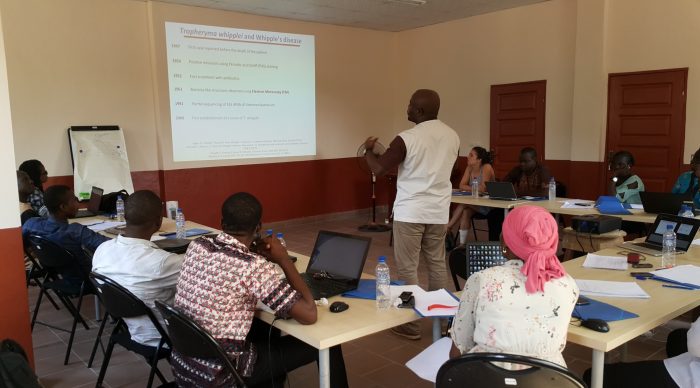In WP5 of the Sonar-Global project, we aim to build capacity by means of providing trainings for (non-) social scientists on social aspects of infectious threats. To facilitate these WP5 capacity-building activities, a mapping is in process on what training infrastructures, needs and resources are already there that could inform our own activities. Since for the Sonar-Global project five focus countries (Bangladesh, Thailand, Uganda, Senegal and Ukraine) were highlighted, it was decided that the mapping should first focus on these countries. The note below reflects information gathered from interviews with Sonar-Global partners and other stakeholders regarding these five countries and will give an idea about what is already out there in terms of trainings on social aspects of infectious threats and what needs are still unmet.
The interviews reflect that in Ukraine, Bangladesh, and Thailand there are hardly any trainings that cover social aspects of infectious threats at this moment. There are several formal institutions in place that teach social sciences, however, according to our respondents, there is hardly any attention to health issues within these social science studies. It is stressed that there is more and more interest from the social sciences to include this focus on health issues in the future. In Uganda and Senegal on the other side, there are formal and informal institutions that cover the social aspects of infectious diseases within their training programs. Usually, a part of a course or curriculum on infectious diseases is directed at the social context. However, these are mostly geared towards epidemics and up to this point do not or only minimally involve antimicrobial resistance.

“MIAA” (Infectious Diseases and Anthropology in Africa) Training in CERFIG, Conakry, Nov. 2017
It seems to be more common to include attention to social aspects in (in)formal training curricula for non-social scientists. Especially within medical and public health training curricula (Bangladesh, Uganda and Ukraine*) as well as training programs for health professionals (Bangladesh, Ukraine and Senegal) the basics of social science are covered related to infectious diseases/threats. However, also here limitations are highlighted: attention to social sciences seems often limited to aspects such as community engagement or communication, and is usually covered within one (elective) course or only as part of a course/training.
Considering the limited amount of training resources in the five countries, the need is stressed to build more capacity on social aspects of infectious threats. The interviewees from Ukraine and Bangladesh stress the urge to facilitate the integration between the social sciences and related non-social sciences in order for the social scientists to more effectively contribute to infectious threats and for non-social scientists to be more aware of the essential social aspects to be considered. This urge is highlighted in the following quote by a consortium member from Bangladesh:
“There is a huge need to involve social scientists and to have these [social] issues integrated into the curriculum. Thus, training for social scientists will be very helpful, so that they can more effectively contribute and be involved. Because infectious threats are not only a clinical issue, it is also a social issue – involving social, economic and political factors.”
Two interviewees add that to facilitate this process a broader range of social aspects needs to be covered in the trainings and that separate trainings are needed that solely cover social aspects of infectious threats. Moreover, antimicrobial resistance seems to be needing the most urgent attention, since this topic is highlighted in four of the five interviews as an issue that needs to be represented in trainings, not only focusing on the social aspects but also from a (para)medical point of view. Our Sonar-Global colleague from Uganda emphasizes this need:
“AMR is even less understood and appreciated. People who studied AMR have largely looked at the biomedical perspective. So, for us to appreciate the social aspects of AMR, there is a big gap there. Because what is spreading AMR is as much social as it is medical – including farming practices, prescription habits.”
In the interview with the Ugandan respondent, it is furthermore stressed that there should be specific attention towards the communication between social scientists and non-social scientists and towards how to quickly access each others valuable research information.
* In Ukraine they are in the process of setting up Public Health schools, since as up to recently there hardly were any. The curriculum of these Public Health schools will include a focus on social aspects of health.

After completing a Bachelors degree in Medicine and a Master’s in Health Sciences, Karlijn started working as a policy officer, educational developer and teacher at the medical department of the UMC Utrecht. She continued working in the field of education as a project manager at Soa Aids Nederland building a digital platform for professionals. She joined AIGHD in March 2019 as a research assistant for the SoNAR Global project where she’s supporting the set up of a network that facilitates capacity building among social scientists specializing in antimicrobial resistance and/or emerging infectious diseases.

Assistant Professor in the Anthropology of Health with nearly 20 years of experience in applied research, including emergency preparedness for natural disasters (flood mitigation) and infectious diseases (HIV/AIDS, Lyme Disease/Tick borne encephalitis, norovirus). Five years of experience as monitoring and evaluation professional for large global health projects, such as USAID’s funded human resources for health strengthening (The Capacity Project), and human rights to health (Bridging the Gaps, Aids Fonds). Danny also sits on the board of Sharenet International, a knowledge platform for sexual and reproductive health and rights. Currently co-leader on capacity building work package for AIGHD’s Horizon 2020-funded program, called Global Social Sciences Network for Infectious Threats and Antimicrobial Resistance (SONAR-Global). Also principal investigator for AIGHD led PrEPArE Consortium (Public Health Emergency Preparedness Assessments for Europe) funded by the European Center for Disease Prevention and Control (ECDC)